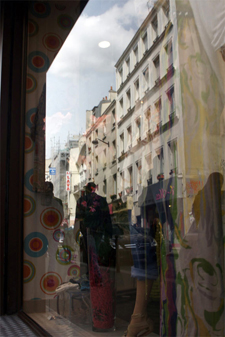Theme Essay by Jonathan Wolfman
How I Betray the Social Contract Each Day
I am a writing irony: I continually betray what I’d thought was my rational, robust commitment to the idea of privacy.
 I cannot look at you squarely and say that what I write (and what I know that I will write) will honor my old standard of jealously guarding my privacy. I betray privacy, breach it, nearly every day.
I cannot look at you squarely and say that what I write (and what I know that I will write) will honor my old standard of jealously guarding my privacy. I betray privacy, breach it, nearly every day.
Our culture once fiercely prized clearly drawn emotional and personal boundaries. We said that such boundaries ought to be strong, if not impregnable. Outside of formal memoir and overtly autobiographical fiction, social commentators such as I were, until quite recently, far more circumspect than I, in fact, have been.
The lines have fast faded. The late Christopher Lasch wrote in his 1977 book on the American family, Haven In a Heartless World, that we are safer, better able to move in the world psychically intact, when we work hard to maintain a distinction between our public and private lives. We should protect, he said, the refuge we have in our families; even more so, we should protect the refuge we have in the idiosyncratic confines of our thoughts.
Our social contract for privacy has been, for at least a generation, deteriorating in metastatic rituals of public confessional. Despite myself, I have contributed through my writing to the spread of the new paradigm and to the old contract’s collapse.
I find myself in a strange place. Where I used to recoil reflexively at the steady Oprahizing and reality-programmed nature of our lives, I am intrigued—even somewhat stung—by the fact that my writing contributes to it, as does my interaction with the many who read my daily efforts.
I realize that I’ve approached this with what Lasch surely would tell me is a layman’s aping of a therapeutic relationship—revealing myself by inches so that my audiences feel increasingly comfortable doing the same. I haven’t done this consciously. I perceived it only after recently rereading over a thousand posts I’ve published since October 2008, as well as the comments I received on them.
I reviewed the nearly 800 pieces I’ve posted at Open Salon and the 300-plus pieces I’ve published at the Pal Talk News Network, here at Talking Writing, at Does This Make Sense, and elsewhere.
 I was stunned to discover that at least half my pieces reveal personal parts of my life and/or the lives of family members, friends, and former students—information that, knowing myself, I’d never be inclined to betray outside of my writing, not even to longstanding friends. The titles include:
I was stunned to discover that at least half my pieces reveal personal parts of my life and/or the lives of family members, friends, and former students—information that, knowing myself, I’d never be inclined to betray outside of my writing, not even to longstanding friends. The titles include:
-
“‘Sweet Jesus, White People Dumb as Shit!’: My Student Explodes the Myth of Cultural Symmetry”
-
“My Bum Kidneys—I Hate Being So Alone in My Luck”
-
“When I Brought the Neo-Nazi to the Jewish Sleep-Away Camp”
-
“My Black Son Owns The Confederate Battle Flag—I Wish I Could”
-
“As a Jew in the Health Debate”
I see now that the pretense that I’m writing under the guise of social commentary has enabled me to exercise online any urge to revelation without the consequences of face-to-face unmasking. This unsettling revelation makes me wonder if my writing—our writing, this explosion of writing in these venues—confirms not so much the thinking of Lasch but rather the feminist writer Carol Hanisch’s now nearly forty-year-old assertion that the personal is, in fact, political.
I can certainly say that the political, in my writing, has been and is increasingly deeply personal. If that’s right, much of me that’s out there—and can never be reeled in—owes itself to and reflects feminist models of thought, sensibility, and interaction far more than I’d imagined.
I’ve found, too, that readers’ responses to my work reflect a willingness, if not an eagerness, to comment as much about themselves as about a position I’ve taken. I sense that the nature of blog posts may make them more likely to invite personal responses than do published pieces in online magazines such as this one.
Here’s just one example. When I’d had quite enough of the latest round by right-wing presidential candidates of bashing the poor, particularly those requiring the public’s assistance, I decided to write (with her enthusiastic nod) of my wife’s having received food stamps when she was just out of art school.
“My Wife Was a Filthy Turn-of-Phrase: Food Stamp Recipient” was published January 19 of this year. Nearly all the responses were from those who supported food stamps, and, in many cases, had used them themselves. Many commenters also offered opinions about the broader political issues.
 Now, it’s possible that I am quite alone among (male?) bloggers in having had to reread many hundreds of my pieces in order to understand that my core may not be what I’d thought it to be. I’ve come to see that how I write, how I use the personal, is gauged to tease out the personal in others.
Now, it’s possible that I am quite alone among (male?) bloggers in having had to reread many hundreds of my pieces in order to understand that my core may not be what I’d thought it to be. I’ve come to see that how I write, how I use the personal, is gauged to tease out the personal in others.
Lasch may have been at least partly right. We now seem to prefer—even if we’re not conscious of or deliberate about it—therapeutic models of presentation, or, more accurately, models of written interaction derived from therapeutic models.
He would argue, of course, that the new model of exposing all has supplanted more dispassionate models, ones he believed were useful because they preserved more of our privacy. As I read him, he mourns the therapeutic coup.
I remain conflicted, often thinking that reading others’ revelatory pieces places me where I ought not to be, despite the fact that I’ve been invited to walk through the door. Other writers’ doors feel all too often more like a series of keyholes. Have I legitimate business taking in others’ medical, psychological, financial, religious, and relational histories and intimacies?
Yet it’s inescapable: While I find the newer, perhaps feminist-influenced cultural paradigm often alien, I’m in it up to my ears.
Publishing information
- Christopher Lasch, Haven in a Heartless World: The Family Besieged (Basic Books, 1977).
- Carol Hanisch, “The Personal is Political,” 1969 (first published in the magazine Notes From the Second Year: Women's Liberation: Major Writings of the Radical Feminists, 1970).
- Jonathan Wolfman, “My Wife Was a Filthy Turn-of-Phrase: Food Stamp Recipient.”
Art Information
- “Café Facets” © Mark W. Suits; used with permission
- “Hospital Squared” © Mark W. Suits; used with permission
- “Faubourg du Temple Ego-Me Go” © Mark W. Suits; used with permission
 Jonathan Wolfman taught for thirty-six years in independent schools and universities in the United States and the People’s Republic of China. He writes about culture, the arts, and politics.
Jonathan Wolfman taught for thirty-six years in independent schools and universities in the United States and the People’s Republic of China. He writes about culture, the arts, and politics.
You can read his “BlogShots” on Open Salon.
